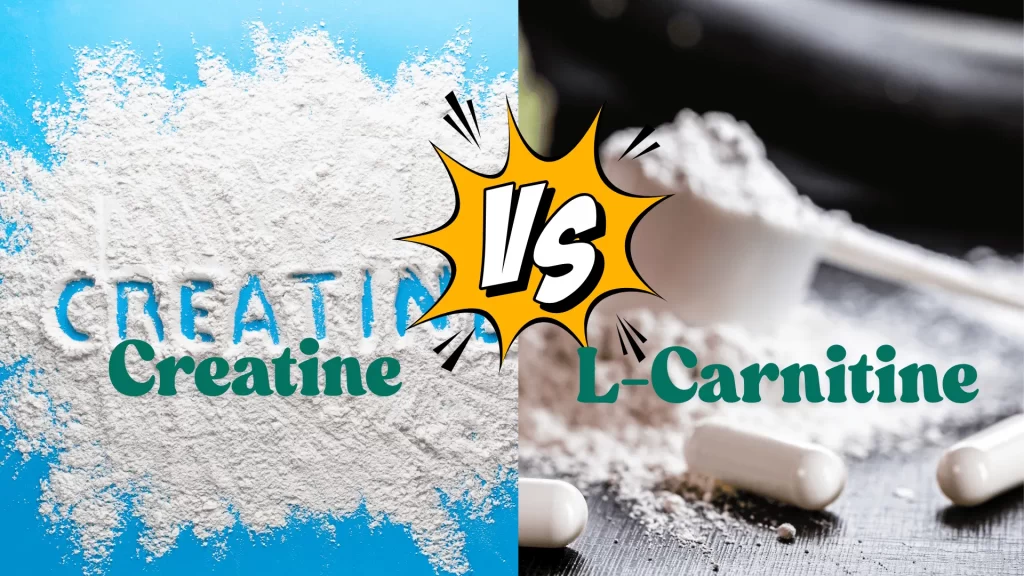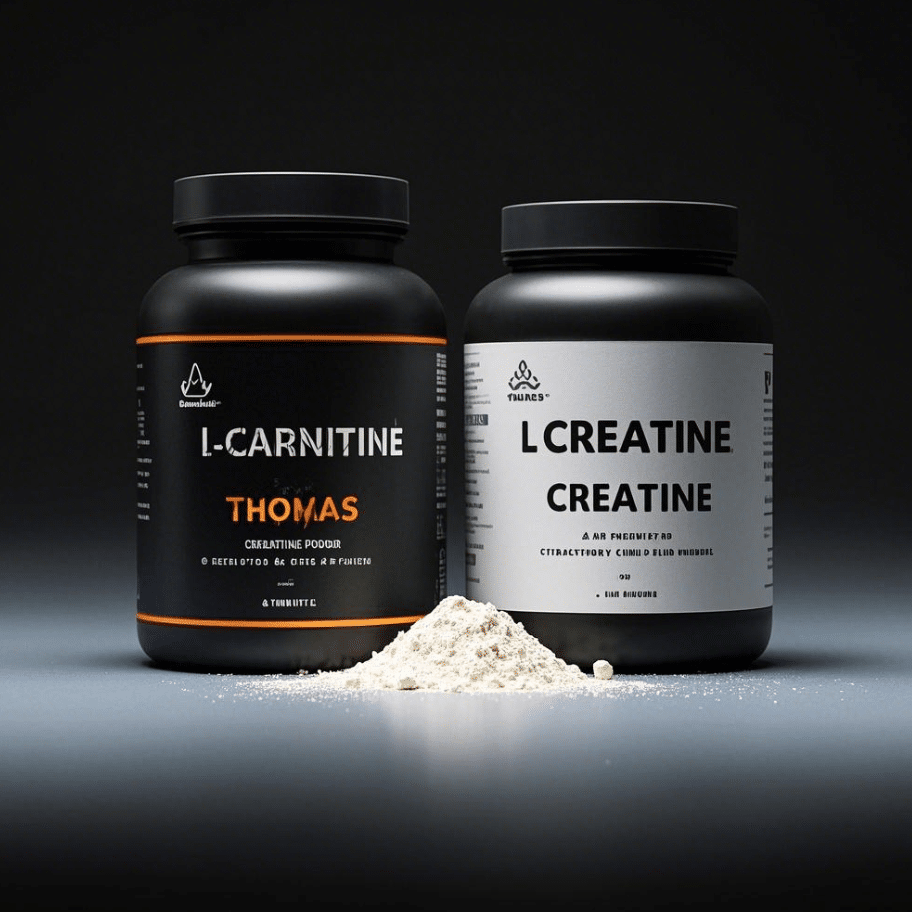L-Carnitine vs Creatine: A Science-Based Comparison for Fitness Goals
In the booming world of fitness supplements, two names stand out: L-Carnitine and Creatine. Whether you’re aiming to burn fat, build muscle, or boost endurance, these supplements promise to enhance your performance. But which one is right for you? This article dives into the science behind L-Carnitine and Creatine, comparing their benefits, mechanisms, and ideal use cases to help you make an informed choice. Let’s explore the key differences and find the best fit for your fitness journey.

What Is L-Carnitine?
Understanding L-Carnitine’s Role
L-Carnitine is a naturally occurring compound derived from amino acids (lysine and methionine). It plays a critical role in fat metabolism by transporting long-chain fatty acids into mitochondria, the powerhouse of cells, where they’re burned for energy. Your body produces L-Carnitine, and you also get it from foods like red meat and dairy. Supplements, typically dosed at 2–4 grams daily, are popular among those seeking fat loss or improved endurance.

Benefits of L-Carnitine
Research suggests L-Carnitine may offer several benefits:
- Fat Burning: By aiding fat transport, it may enhance fat oxidation, especially during exercise. A 2011 study in The Journal of Physiology found modest fat loss in supplemented groups.
- Endurance Boost: L-Carnitine may improve stamina by sparing glycogen and using fat as fuel, ideal for long workouts.
- Recovery Support: Some studies, like one in Metabolism (2010), indicate it reduces muscle damage and soreness post-exercise.
However, results vary. L-Carnitine’s fat-burning effects are most pronounced in people with low baseline levels, such as vegans or older adults.
Is L-Carnitine Safe?
L-Carnitine is generally safe at recommended doses, though high amounts (above 5 grams) may cause nausea or diarrhea. Always choose third-party tested products, certified by NSF or Informed-Sport, for quality assurance.
What Is Creatine?
Creatine’s Role in the Body
Creatine is a compound made from three amino acids (arginine, glycine, and methionine) and stored mainly in muscles. It fuels high-intensity activities by replenishing adenosine triphosphate (ATP), the body’s energy currency. You get Creatine from foods like fish and beef, but supplements—typically 3–5 grams of Creatine monohydrate daily—are widely used to boost performance.
Benefits of Creatine
Creatine is one of the most researched supplements, with robust evidence supporting its effects:
- Muscle Growth: Creatine increases water retention in muscles, promoting growth. A 2003 study in Journal of Strength and Conditioning Research showed significant muscle gains in weightlifters.
- Strength and Power: It enhances performance in short, explosive movements like sprinting or lifting.
- Brain Health: Emerging research, such as a 2019 study in Nutrients, suggests Creatine may support cognitive function under stress.
- Quick Results: Unlike L-Carnitine, Creatine’s effects are noticeable within 1–2 weeks, especially with a loading phase (20 grams daily for 5–7 days).
Is Creatine Safe?
Creatine is safe for most people, backed by decades of research. Common side effects include slight weight gain (due to water retention) and, rarely, stomach discomfort. Concerns about kidney damage or hair loss lack solid evidence when used at recommended doses. As with L-Carnitine, opt for high-quality, certified products.
L-Carnitine vs Creatine: A Head-to-Head Comparison
To help you decide, let’s break down the key differences between L-Carnitine and Creatine across several factors.
How They Work
- L-Carnitine: Focuses on fat metabolism, shuttling fatty acids to mitochondria for energy. It’s ideal for endurance activities or fat-loss goals.
- Creatine: Boosts ATP production, fueling high-intensity, short-duration exercises like weightlifting or sprinting. It’s best for power and muscle gain.

Who They’re For
- L-Carnitine: Suits endurance athletes, those aiming to burn fat, or vegans (who may have lower levels due to diet). It’s also popular for recovery-focused routines.
- Creatine: Perfect for strength trainers, bodybuilders, or anyone doing high-intensity workouts. It’s a go-to for muscle and performance gains.
Effectiveness and Timing
- L-Carnitine: Effects are subtle and may take weeks or months to notice, especially for fat loss. Results depend on diet and exercise consistency.
- Creatine: Delivers fast results, with strength and muscle improvements often visible in 1–2 weeks, particularly with a loading phase.
Side Effects
- L-Carnitine: Minimal side effects, though high doses may cause digestive issues. No significant long-term risks at standard doses.
- Creatine: May cause water weight gain (1–3 pounds), which is normal and temporary. Rare cases of bloating or cramping can occur.
Cost and Dosage
- L-Carnitine: Costs $0.20–$0.50 per serving (2–4 grams). Liquid or capsule forms are common.
- Creatine: More affordable at $0.05–$0.15 per serving (3–5 grams). Creatine monohydrate is the most cost-effective and researched form.
Comparison Table
| Factor | L-Carnitine | Creatine |
|---|---|---|
| Primary Role | Fat metabolism, endurance | ATP production, strength |
| Best For | Fat loss, endurance, recovery | Muscle gain, power, high-intensity |
| Dosage | 2–4 grams daily | 3–5 grams daily |
| Effect Speed | Weeks to months | 1–2 weeks |
| Side Effects | Mild digestive issues (high doses) | Water retention, rare bloating |
| Cost per Serving | $0.20–$0.50 | $0.05–$0.15 |
This table highlights that L-Carnitine and Creatine serve different purposes, making them complementary rather than competing options in many cases.
How to Choose: L-Carnitine, Creatine, or Both?
Your fitness goals and lifestyle determine which supplement—or combination—works best. Here’s a guide to help you decide.
Choose L-Carnitine If:
- You’re Focused on Fat Loss: Pair L-Carnitine with a calorie-controlled diet and cardio for potential fat-burning benefits.
- You Do Endurance Training: Runners, cyclists, or swimmers may benefit from improved stamina and recovery.
- You’re Vegan or Vegetarian: Plant-based diets often lack L-Carnitine-rich foods, making supplementation useful.
Choose Creatine If:
- You Want Muscle and Strength Gains: Creatine is a proven ally for weightlifting, CrossFit, or sprinting.
- You Need Quick Results: Its fast-acting nature makes it ideal for those seeking immediate performance boosts.
- You’re on a Budget: Creatine’s low cost and high efficacy make it a no-brainer for most gym-goers.
Can You Take Both?
Yes! L-Carnitine and Creatine target different pathways, so combining them is safe and potentially synergistic. For example, use Creatine for strength workouts and L-Carnitine for cardio or fat-loss phases. A common stack is 3 grams of Creatine post-workout and 2 grams of L-Carnitine with a meal. Consult a nutritionist to tailor dosages to your needs.
Special Considerations
- Older Adults: Creatine may help preserve muscle mass, while L-Carnitine supports energy metabolism.
- Vegans: Both supplements address nutrient gaps, as plant-based diets lack rich sources of either compound.
- Buying Tips: Look for reputable brands with third-party testing. Avoid proprietary blends that hide dosages.
Conclusion: Make the Right Choice for Your Goals
L-Carnitine and Creatine are powerful tools in the fitness world, but they shine in different areas. L-Carnitine is your ally for fat loss, endurance, and recovery, while Creatine excels at building muscle and boosting strength. Depending on your goals, you might choose one, both, or neither—always aligning with a solid diet and training plan.
Ready to level up your fitness? Explore our guide to protein powders or check out trusted supplement brands at Gensei. Share this article with your gym buddies, and let us know your supplement tips in the comments below!
FAQs About L-Carnitine and Creatine
What’s Better, Creatine or L-Carnitine?
It depends on your goals. Creatine is better for building muscle, increasing strength, and boosting high-intensity performance, with effects noticeable in 1–2 weeks. L-Carnitine suits fat loss, endurance, or recovery, but its effects are slower and less pronounced. Choose Creatine for muscle gain or L-Carnitine for fat-burning support, or combine them for complementary benefits.
Can I Use Creatine and L-Carnitine Together?
Yes, you can safely combine Creatine and L-Carnitine. They target different pathways—Creatine enhances ATP production for strength, while L-Carnitine aids fat metabolism. A common approach is 3–5 grams of Creatine post-workout and 2 grams of L-Carnitine with a meal. Consult a nutritionist for personalized dosing.
Can You Build Muscle With L-Carnitine?
L-Carnitine isn’t primarily for muscle building. Its main role is fat metabolism and endurance support. While it may aid recovery, reducing muscle soreness (per a 2010 Metabolism study), it’s far less effective than Creatine for muscle growth. For bulking, prioritize Creatine, protein, and resistance training.
Is L-Carnitine the Best Fat Burner?
L-Carnitine isn’t the best fat burner. It may enhance fat oxidation during exercise, especially in those with low levels (e.g., vegans), but studies (like a 2011 Journal of Physiology review) show modest effects. Diet and exercise remain the most effective fat-loss tools. Other supplements, like caffeine, may outperform L-Carnitine for fat burning.
What Should You Not Mix With Creatine?
Creatine is safe to mix with most supplements, including L-Carnitine, protein, or pre-workouts. However, avoid taking it with high-sugar drinks during a cutting phase, as they may counteract fat-loss goals. There’s no evidence of harmful interactions with common supplements, but consult a doctor if combining with medications.
Is L-Carnitine Safe for Kidneys?
L-Carnitine is generally safe for kidneys in healthy individuals at recommended doses (2–4 grams daily). A 2013 study in Clinical Nutrition found no adverse kidney effects with standard use. However, those with pre-existing kidney issues should consult a doctor before supplementing, as high doses may strain renal function.
Can I use Creatine and L-Carnitine together?
Yes, they’re safe to combine as they target different pathways—Creatine boosts ATP for strength, L-Carnitine aids fat metabolism. A typical stack is 3–5g Creatine post-workout and 2g L-Carnitine with meals.
Does L-Carnitine actually work?
L-Carnitine works modestly for fat burning and endurance, especially in vegans or those with low levels, but results vary and require consistent exercise and diet (2010 Metabolism study).
What is more effective than Creatine?
For muscle growth and strength, few supplements outperform Creatine, which is backed by decades of research (Journal of Strength and Conditioning Research, 2003). Protein supplements and anabolic steroids (if legal and prescribed) may complement or exceed it, but Creatine remains top-tier.
What should you not mix with Creatine?
Creatine is safe with most supplements, but avoid high-sugar drinks during cutting phases, as they may hinder fat loss. No evidence suggests harmful interactions with common fitness supplements.
Does L-Carnitine affect sperm count?
Limited evidence suggests L-Carnitine may improve sperm motility in men with fertility issues (Fertility and Sterility, 2004), but no clear impact on sperm count in healthy individuals. More research is needed.
Is L-Carnitine for bulking or cutting?
L-Carnitine is better for cutting, as it supports fat metabolism and endurance, though its effects are modest. For bulking, Creatine and high-calorie diets are more effective.



